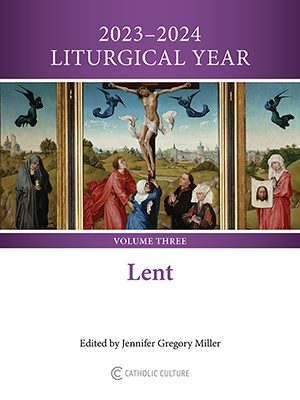Prayer: When Asking is . . . Not Asking?
By Peter Mirus ( bio - articles - email ) | Oct 18, 2004
In Luke 11:9 our Lord states that if we ask, we shall receive. We should approach our heavenly Father with our petitions with firm faith that He will grant our needs. But how do we ask for favors from God? How do we ask God to give us what we need and bring us closer to Him? According to St. Teresa of Avila, St. Bernard of Clairvaux, St. Francis de Sales and other great saints, sometimes the best way to ask is simply not to ask.
Well, at least not in the conventional sense. For most of us, our common experience with prayer of petition is the same. In public prayer, we directly ask God for the things that we need, and privately we internalize this same form of vocal expression. We have a specific thing that we think would be best for us, and we ask God to deliver it. Perhaps some of us try to pray more often for the grace to do the will of God—not asking for specific things, but simply that His will be done.
A Higher Form of Petition
While the great spiritual writers tell us that this type of prayer is necessary and commendable in those who are seeking to grow spiritually, they also teach that it is not the highest form of petition. The highest form of petition requires that we maintain pure humility. How do we do this? First, by contemplation of God’s great love for us in comparison to our own lack of worth and lack of deservedness. Second, by coming through this contemplation to a complete love for God and total lack of self-interest (except a desire to grow closer to Him).
The highest form of petition, therefore, consists not in a verbalized prayer for favors, but rather in the recognition of our lack of deservedness. Through cultivation of humility and the redirection of our love towards God and away from ourselves, we become full of faith and hope. This is because we come to the realization that God grants his favors to whom He wills, when He wills, and in what manner He wills. Both physical needs and spiritual favors will be granted to us if only we do His will. What results is a clarity of mind that frees us from worry and helps us to endure trials, both physical and spiritual, with a sense of peace.
At some point along our road to spiritual perfection, our primitive petitions cease to be necessary as our being itself is transformed into a petition to our Lord. Our renewed self asks God not that he be with us in certain moments, for certain things and in certain ways, but that He will be with us all of the time, completely. This petition is made by means of a complete death to self, thus creating an unreserved offering of that self to God.
How Can We Achieve This Elevated Plane?
This mode is clearly not intended (or possible) for all souls in all states of development. Whether conducted in a more verbal manner or as an expression of being, an ongoing dialogue with our Lord, including prayers of petition, is a healthy activity and is to be encouraged. Even souls attaining a higher plane of spiritual activity experience periods of aridity in which the more vocal form of petition is heartily encouraged. The higher level of prayer to which the great saints call us is something that occurs naturally as part of spiritual development rather than as a forced activity. It is a goal to strive for, but not necessarily a mode that can be attained through the practice of its most apparent characteristics.
Personal Experience
Each individual should seek personalized advice from a qualified spiritual director to determine what method of advancement is right for him or her. My own progress is seldom straight-ahead work—and oftentimes is most successful when I am granted glimpses into my own hypocrisy. For example, I am always asking, petitioning the Lord to take possession of my heart and soul. At first this seemed like an unselfish prayer, but I later realized that my prayer is still imperfect. The problem is that I want the Lord to take possession of me.
My best moments come when I realize that He won’t take unless I give. And no matter how many steps forward I take, I’m increasingly aware of how far short I am of making an unreserved gift of self.
According to the great masters of the spiritual life, this awareness should color all our prayer.
Further Reading
St. Teresa of Avila: Interior Castle St. Bernard of Clairvaux: In the Steps of Humility St. Francis de Sales: Introduction to the Devout Life
All comments are moderated. To lighten our editing burden, only current donors are allowed to Sound Off. If you are a current donor, log in to see the comment form; otherwise please support our work, and Sound Off!





 Peter Mirus is a business, marketing, and technology consultant with more than 20 years of experience working with companies and nonprofits, ranging from start-ups to large international organizations. From 2004-2014 he contributed articles on the Catholic Faith, culture, and business to the CatholicCulture.org website.
Peter Mirus is a business, marketing, and technology consultant with more than 20 years of experience working with companies and nonprofits, ranging from start-ups to large international organizations. From 2004-2014 he contributed articles on the Catholic Faith, culture, and business to the CatholicCulture.org website.



